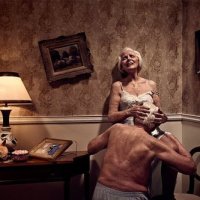It can be easy and pleasurable to generate funds to help support HIV work, both in the UK and Africa. The following story is an example of how Yoga classes, an Auction and a Barbecue can help raise money for good causes.
The Global Natural Healthcare Trust (GNHCT) are a UK based registered charity founded by Cornish local Annette Montague-Thomas. Annette has over 25 years experience in Africa where she has worked for UNICEF in Nairobi in Kenya, and in the past 9 years has been assisting young children who are afflicted and affected by the HIV/AIDS pandemic in South Africa. Overseas, they are based on The Orange Farm informal settlement which is about one and a half hours South of Johannesburg.
The settlement is home to over 4 million Africans of varying tribes. The settlement is not only the largest in South Africa, but in the whole of Africa. It is fair to state that not even one quarter of the residents have any work and many are surviving at near starvation level. They live in abject poverty with homes that are usually no more than shacks with no sewerage system. Many of the homes don’t even have running water.
A recent event by “Yoga Rocks” at Lusty Glaze Beach raised £650 for he Global Natural Health Care Trust and this money will help support the charity’s work in Africa to help people affected by HIV.
The evening of yoga classes with some of the UK’s top teachers included a charity auction and a barbecue provided by chefs at Lusty Glaze and enjoyed by more than 150 people.
The charity runs a herbal clinic in the country’s worst-affected area, helping to save lives on a daily basis as well as providing homes for more than 10,000 orphans in its foster care system.
Yoga Rocks’ founders are yoga teacher Rhoda McGivern, Debbie Luffman from Finisterre and Gemma Ford from Love Yoga Online.
Mrs McGivern said: “The atmosphere was so lovely, we can’t believe how many people turned up on a rainy Monday evening to help us to raise money for a charity so close to our hearts.”
They have thanked everyone who volunteered to make the event happen, especially the team from Finisterre whose energy and enthusiasm were “simply amazing”.
The Yoga Rocks’ team is organising future events to be held in various venues around Cornwall, with potential venues also in London and America.
To offer help, please contact rhomcgivern@gmail.com or visit their websites:
Original article compiled from the above sources and thisiscornwall





